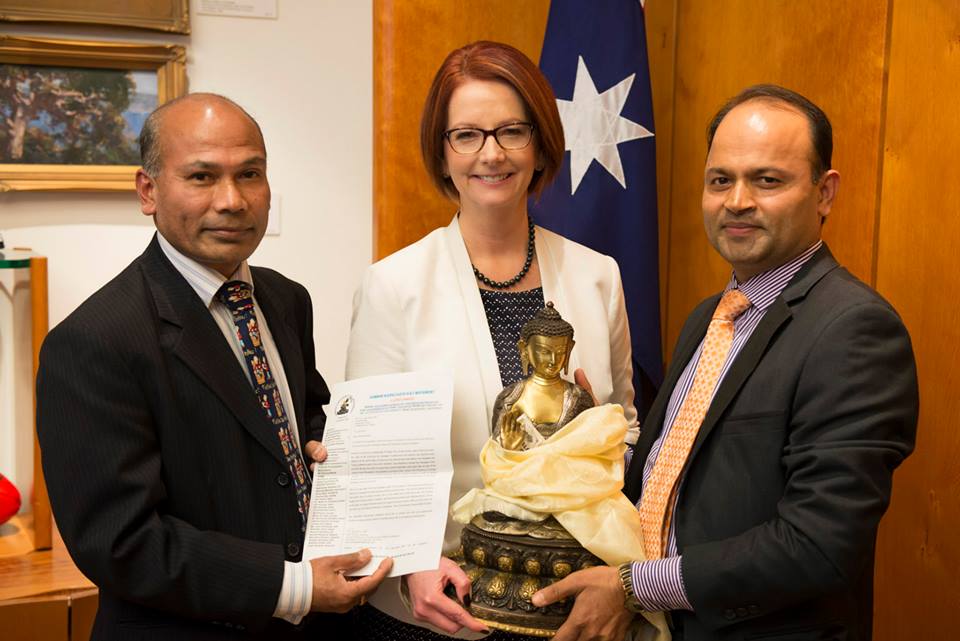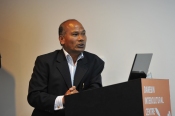Posts Tagged ‘Society’
Posted by Ram Kumar Shrestha on August 25, 2012
How we remember a religious figure says a lot about ourselves

TIM GRAHAM / GETTY IMAGES Mother Teresa accompanied by children at her mission in Calcutta, Dec. 5, 1980.
How do secular people remember a saint? As Mother Teresa‘s birthday on August 26th and the anniversary of her death on September 5th approach, I found myself thinking about this. I tried to imagine what I would know about the woman, 15 years gone, if I didn’t write about religion for a living. Probably that she was good to the poor. Short. A friend of Lady Di’s. I concluded that unless I were a pious Roman Catholic, I would know very little, which led me to consider the difference between the way the Roman Catholic church treats its deserving dead and the way society at large does.
(PHOTOS: For the Centenary of Mother Teresa’s Birth, a Trove of Rare Photos)
Here’s how her Church remembers a Teresa. The moment she dies, a clock starts ticking. After a year the Vatican commences an investigation into her possible sainthood. That process’s first step is to determine that — in life — she had exhibited qualities (“heroic virtue”) that Catholicism finds amazing and exemplary. Next the focus shifts to her post-life. In 2002, the Vatican validates as miraculous the disappearance of a tumor in a woman who prayed to Teresa in heaven, and consequently, 250,000 people flock to Rome to attend her “beatification” as the Blessed Teresa. There is anticipation of and perhaps some impatience about a second miracle — not yet identified — that will enable her to be canonized as a saint. There are hurdles and steps, disappointments and triumphs, through which Teresa’s afterlife becomes nearly as eventful as her pre-death. Year after year, believers are led through a dynamic process defining and testing her meaning to the church.
Now compare this to the way in which non-Catholics are remembering — or rather, rapidly forgetting — Mother Teresa. For the most part, Americans are the opposite of the kid in The Sixth Sense: we don’t see dead people. Actors and artists may live on through films or novels; athletes perhaps on videotape. Save for U.S. presidents and Martin Luther King, Jr., moral and political heroes quickly devolve into name-checks. It’s as if the more polarized and fragmented a society we become, the less agreement there is on who should be remembered. Read the rest of this entry »
35.387579
-85.962483
Posted in Article | Tagged: beatification of Mother Teresa, Catholicism, Mother Teresa, Religion, Roman Catholic Church, sainthood, saints, Society, the poorest of the poor, working with the poor | Leave a Comment »
Posted by Ram Kumar Shrestha on July 25, 2012
Why should one group have a monopoly on meritocracy?
TIME will alert you each time a story is shared and you’ll have the option to keep or remove each story from your Facebook Timeline. Plus, view “Your Activity” to see a history of stories you’ve read and remove stories from your Timeline.
Liu’s latest book is The Gardens of Democracy: A New American Story of Citizenship, the Economy, and the Role of Government
This has been a summer of elite discontent.
First there was the feverishly debated essay by Princeton’s Anne-Marie Slaughter about the inability of privileged professional women like her to “have it all” — career stardom and family fulfillment. Then Harvard Business School’s Clayton Christensen asked why so many of his HBS classmates have lived lives without purpose or integrity. Now comes a damning book by MSNBC’s Chris Hayes, The Twilight of the Elites, which indicts the nation’s leadership class for self-dealing self-centeredness — inciting many in that class to self-justifying self-analysis.
(MORE: Judith Warner: We Have to Stop Talking About ‘Having It All’)
It’s somewhere between poignant and pitiable that educated overachievers seem only lately to be realizing that they (we — who am I kidding?) aren’t guaranteed happiness or esteem. But the real problem today isn’t that things are stressful for the most affluent and credentialed 20% or 10% or 1%; it’s that for the rest of the country social mobility has all but disappeared. Meritocracy may be a grind, but for those outside the upper-middle class, it’s simply ground to a halt. Read the rest of this entry »
35.387579
-85.962483
Posted in Article | Tagged: Anne-Marie Slaughter, Business & Tech, career advantages, Chris Hayes, Family, merit, meritocracy, opportunity, opportunity gap, Society, Success, the Twilight of the Elites, upward mobility | Leave a Comment »
Posted by Ram Kumar Shrestha on June 28, 2012
Our binary way of thinking about race prevents us from openly discussing the challenges that still exist
JUSTIN SULLIVAN / GETTY IMAGES
Pedestrians walk by an American flag mural in Chinatown on June 19, 2012 in San Francisco, Calif.
Liu’s latest book is The Gardens of Democracy: A New American Story of Citizenship, the Economy, and the Role of Government
Last week, the Pew Research Center released a report called “The Rise of Asian Americans,” offering a portrait seemingly full of good news. Asian Americans, Pew said, are on the whole more educated, affluent and happier than other Americans. They hew more strongly to family values and an ethic of hard work. And, quietly, these 17 million Asian Americans have surpassed Hispanics as the largest and fastest-growing cohort of immigrants to the U.S.
(MORE: Christopher J. Ferguson: What You Need to Know About the New Census Numbers on Hispanic Births) Read the rest of this entry »
35.387579
-85.962483
Posted in Article | Tagged: Asian Americans, model minority, Pew Research Center, Society, the Rise of Asian Americans, U.S. | Leave a Comment »
Posted by Ram Kumar Shrestha on May 14, 2012
Contrary to popular belief, intensive mothering is the product of the rise of women in society

CORBIS
A rally for passage of the Equal Rights Amendment, October 12, 1981
Feminism and motherhood have long been cast as feuding sisters, one always attempting to undermine the other. In this calculation, women had to choose between the independence, education and self-expression of the feminist path and the nurture, sacrifice and child-centricity of the family path. The more feminist a woman is, the less appetite, it has been suggested, she will have for mothering.
Ironically, however, the opposite is true.
Women’s rising social and economic power has not squelched their desire to be mothers. Quite the opposite: it has enabled women to mother with ferocity. They research; they seek out best practices; they join a group, form a committee and agitate for their version of feeding/disciplining/sleeping. If you don’t believe me, just visit a breast-feeding support group with former litigators, marketing executives and investment bankers. Reluctant sucklers don’t stand a chance. Read the rest of this entry »
35.387579
-85.962483
Posted in Article | Tagged: Dr. Sears, Family, Feminism, motherhood, Parenting, Sex, Society | Leave a Comment »
Posted by Ram Kumar Shrestha on March 8, 2012
I’ve always assumed that women are fully autonomous human citizens—who vote, even!—but now I’m not so certain

LUKE SHARRETT / THE NEW YORK TIMES / REDUX
From left: Catholic Bishop William Lori, the Rev. Matthew Harrison, Dr. Ben Mitchell, Rabbi Meir Soloveichik and Craig Mitchell

are sworn in during a House Oversight and Government Reform Committee hearing on Capitol Hill in Washington, on Feb. 16, 2012. The hearing was called to discuss the Obama administration’s contraceptive policy for employees at religious institutions.
All my adult life, I’ve been pretty sure I’m a sentient, even semi-competent human being. I have a job and an apartment; I know how to read and vote; I make regular, mostly autonomous decisions about what to eat for lunch and which cat videos I will watch whilst eating my lunch. But in the past couple of months, certain powerful figures in media and politics have cracked open that certitude.
You see, like most women, I was born with the chromosome abnormality known as “XX,” a deviation of the normative “XY” pattern. Symptoms of XX, which affects slightly more than half of the American population, include breasts, ovaries, a uterus, a menstrual cycle, and the potential to bear and nurse children. Now, many would argue even today that the lack of a Y chromosome should not affect my ability to make informed choices about what health care options and lunchtime cat videos are right for me. But others have posited, with increasing volume and intensity, that XX is a disability, even a roadblock on the evolutionary highway. This debate has reached critical mass, and leaves me uncertain of my legal and moral status. Am I a person? An object? A ward of the state? A “prostitute”? (And if I’m the last of these, where do I drop off my W-2?)
In the hopes of clarifying these and other issues, below I’ve recapped recent instances of powerful men from the fields of law, politics and literature tackling the question that has captured America’s imagination: Are Women People? Read the rest of this entry »
35.387579
-85.962483
Posted in Article | Tagged: discrimination, Rush Limbaugh, Society, U.S., Women, Women's Rights | Leave a Comment »
Posted by Ram Kumar Shrestha on February 11, 2012
And their parents might be getting just what they deserve
MARCELO SANTOS / GETTY IMAGES
Warner’s latest book is We’ve Got Issues: Children and Parents in the Age of Medication.
Amidst all the talk this past week about Pamela Druckerman’s new book, Bringing Up Bébé: One American Mother Discovers the Wisdom of French Parenting, there was one phrase that immediately lodged itself in my mind. It was in a sidebar that ran with the Wall Street Journal adaptation of her book,“Why French Parents Are Superior,” and it said this: “Children should say hello, goodbye, thank you and please. It helps them to learn that they aren’t the only ones with feelings and needs.”
That statement points directly to what I see as one of the most meaningful differences between the French and (contemporary) American style of parenting. I don’t happen to believe, as the Journal pushed Druckerman’s argument to say, that French parenting is necessarily superior, overall, to what we do in America. I don’t think French children are, overall, better or happier people — such generalizations are silly. But it is true that French kids can be a whole lot more pleasant to be around than our own. They’re more polite. They’re better socialized. They generally get with the program; they help out when called upon to do so, and they don’t demand special treatment. And that comes directly from being taught, from the earliest age, that they’re not the only ones with feelings and needs.
(MORE: Warner: Girl Scout Cookies: The Latest Controversies)
I say all this based on many years of extended hanging out time with French families, both before and after my own girls — who, like Druckerman’s children, were born in France — came along. In fact, that experience — and the contrast with the American way of parenting I discovered when I moved back to the States — inspired my book Perfect Madness: Motherhood in the Age of Anxiety, the main argument of which Druckerman recapitulates at the very beginning of Bringing Up Bébé. (Fuller disclosure: she interviewed me for the book as well.) Read the rest of this entry »
35.387579
-85.962483
Posted in Article | Tagged: Bringing Up Bebe, Children, Family, France, French children, Life & Style, Pamela Druckerman, Parenting, Society | Leave a Comment »
Posted by Ram Kumar Shrestha on July 25, 2011
Travelling to communist Russia inspired David Cameron to become involved in politics, the prime minister has revealed.
In an column for the Big Issue, the prime minister admits he was never “one of those people who mapped out their career on the back of an envelope” but says his trip to the Eastern bloc had a “massive impact” on him.
“I will never forget the greyness of life under Communism, the lack of choice, freedom and expression. I began to develop a political consciousness, a sense of what was right and wrong.”
Cameron, who is guest editing this week’s issue of the magazine, also discusses failure, his family and what he would say to his younger self.
In one of the prime minister’s most personal admissions yet, he says he would tell his 16 year old self that failure “makes you a stronger person.”
“For a lot of young people, the idea that you shouldn’t try at something because you might not succeed is pretty seductive. I was no exception. At school, there were some subjects, some sports, where I didn’t always put the effort in – but instead just went through the motions, drifting along, rather than giving it everything.” Read the rest of this entry »
35.387579
-85.962483
Posted in International | Tagged: Big Issue, Big Society, Communism, David Cameron, Family, Society, Uk Diary, Uk Issues, UK Politics News, UK Prime Minister | Leave a Comment »



























![A Stylish Bar 705a1-1 [in Explore] A Stylish Bar 705a1-1 [in Explore]](https://live.staticflickr.com/65535/53819420884_7fd6cd7c50_s.jpg)





























